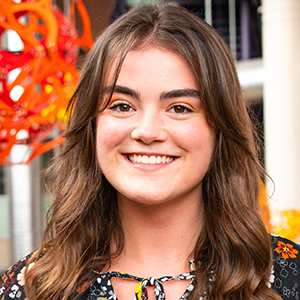
Industry predoc offers space to ponder the next step
Senior year of college is a time to begin wrapping up one adventure and start planning for the next. But what if that plan doesn’t come together?
Last year, I was a senior at Albion College, finalizing a list of Ph.D. programs I might apply to and imagining the year ahead, living in a new city and starting my next academic chapter. Like many students at small, liberal arts colleges, I found myself bustling around campus, hopping from one lab, rehearsal or club meeting to another, with barely a moment to rest. I loved the busyness of it all, especially because I knew once graduation rolled around, many of these experiences would come to an end.

As the semester progressed, I realized I couldn’t narrow down what I wanted to be doing in a year, or even in five years. I felt like I had so much purpose on my campus, but I couldn’t figure out what type of research I was most passionate about and wanted to study for the next six years. Everything seemed interesting — from chemical biology to bioengineering, I felt like I needed to try it all before I could find my place in the scientific world.
This need to keep every scientific door open became overwhelming. How could I choose a graduate program, let alone a lab and a principal investigator, if everyone’s science was so inspiring?
The move into industry
While I was preparing my application materials for grad school and becoming increasingly overwhelmed, I learned about an industry opportunity at Adimab, LLC, specifically designed for recent bachelor’s graduates interested in getting a Ph.D. Through a connection from my undergrad adviser, I was encouraged to apply to this program as a way to gain industry experience before returning to school. This two-year predoctoral research associate position at a biotech company includes working to discover and optimize antibodies for future therapeutics while also receiving career mentorship from Ph.D. scientists within the company.
I was interested in being a predoc at Adimab. I knew I needed time to decompress after my busy college life and before starting an even more demanding schedule in grad school. The paper application was quite simple; the bulk of the process was interviews, including several hours onsite. While this was daunting, the company culture of Adimab felt overwhelmingly positive and supportive, so I left any interview feeling excited about what was next.
Once I received an offer, I started making plans to move from Michigan to New Hampshire, where I now work onsite doing lots of bench work and data analysis. This is a salaried position with competitive earnings and great benefits. I also received reimbursement for much of my moving expenses, which helped me make a smooth transition.
What does a predoc do?
My typical day as a predoc at Adimab follows a standard 8 a.m. to 4 p.m. schedule. I’m in the discovery group where our goal is to discover antibodies from mouse, human, or llama immune repertoires. Often I work on a couple of research projects simultaneously along with one main discovery effort. While my research projects are focused on antibody discovery in animals, we constantly collaborate with other teams within the company. This is a great way to learn more about cloning, sequencing, antibody purification and many other aspects of developing an antibody with favorable profiles to a given target.
My job also involves attending meetings and seminars, ranging from companywide to predoc–specific. The predoc program accepts three to five people per year, so our meetings are small and mainly discussion based. Topics include how to choose a PI, grant-writing tips and tricks, potential Ph.D. careers and panels for general grad school advice.
When I was an undergrad, I had resources to address many of these topics, but I was consumed by other responsibilities that pushed grad school preparation to the back burner. At Adimab, I’ve gained valuable lab experience while also having the time and space to think about what’s next for me.
Taking time
During my senior year, I was unable to prioritize activities such as reaching out to grad school labs to gain insight into their research and group dynamics, exploring a wide range of careers through informational interviews with scientists outside academia and, most importantly, determining why I wanted to earn a Ph.D. Working for a couple of years in industry is allowing me to take time to consider all these things before making my next big academic decision. The mentorship I received in undergrad plus the guidance from Adimab’s predoc program makes me confident that pursuing a Ph.D. is truly what I want to do next, especially since I now have a better understanding of careers that require and don’t require a doctoral degree.
I needed to take extra time to consider what I value in my career and my life to feel confident about what my scientific future holds. Leaving undergrad, I felt prepared for graduate school in terms of my lab experience and coursework, but I needed time to consider more career pathways before heading into Ph.D. training. Looking back, I am glad I took the time in undergrad to focus on becoming a well-rounded student and adult.
Now I have time in my schedule to think about what’s next and make connections with scientists working in careers I didn’t even know existed. Networking beyond academia has opened doors in all scientific directions and has helped me imagine what lifestyles I can expect with certain careers. For example, jobs revolving around clinical health often have less flexibility in terms of working hours but can be found anywhere in the country. Alternatively, jobs in biotech might be more flexible and offer more benefits but tend to be geographically limited.
Understanding the timeline to become a tenured professor at a large university opened my eyes to the commitment someone must have to remain in academia after earning a Ph.D. This contrasts with jobs in industry that are available to scientists immediately after completing their degree. A scientist in academia has more ownership and freedom in their research, but a scientist in industry isn’t required to complete a lengthy postdoc fellowship and apply for grants. Learning all the pros and cons of each career direction paints a better picture of what my life might look like after grad school.
After working in this position for almost a year, I’ve begun to focus my scientific interests. I’m considering Ph.D. programs in immunology or bioengineering, and I feel ready for my next academic endeavor. While I’m still narrowing down the exact programs I’m interested in, I have a real sense of where my scientific passions will lead me and what careers will fit into the lifestyle I plan to have.
Taking time in industry between undergrad and grad school can be an excellent way to ensure your priorities align with what you value both as a scientist and as a person moving into the next stage of life.
Enjoy reading ASBMB Today?
Become a member to receive the print edition four times a year and the digital edition monthly.
Learn moreFeatured jobs
from the ASBMB career center
Get the latest from ASBMB Today
Enter your email address, and we’ll send you a weekly email with recent articles, interviews and more.
Latest in Careers
Careers highlights or most popular articles

Defining JNKs: Targets for drug discovery
Roger Davis will receive the Bert and Natalie Vallee Award in Biomedical Science at the ASBMB Annual Meeting, March 7–10, just outside of Washington, D.C.

Upcoming opportunities
No matter where you are in your career and what future path you aspire to, everyone needs leadership skills. Join ASBMB for practical strategies for building and practicing leadership skills.

Close out ASBMB 2026 with a bang
The closing reception of the 2026 ASBMB Annual Meeting will be held at the Torpedo Factory Art Center in Alexandra, Virginia.

Redefining lipid biology from droplets to ferroptosis
James Olzmann will receive the ASBMB Avanti Award in Lipids at the ASBMB Annual Meeting, March 7–10, just outside of Washington, D.C.

Creating change in biochemistry education
Pamela Mertz will receive the ASBMB William C. Rose Award for Exemplary Contributions to Education at the ASBMB Annual Meeting, March 7-10 in Washington, D.C.

Trainee mentorship as immortality
Suzanne Barbour will receive the ASBMB Sustained Leadership Award at the ASBMB Annual Meeting, March 7-10 in Washington, D.C.

